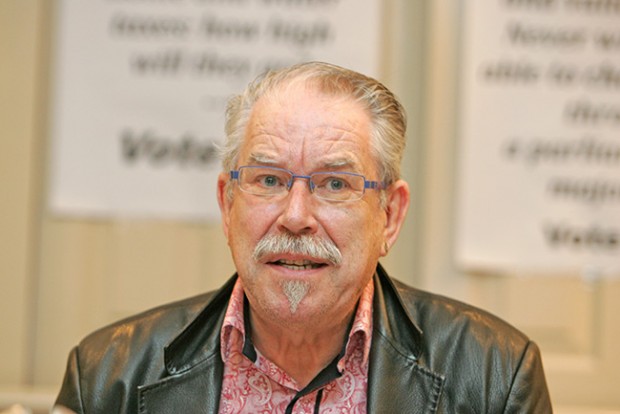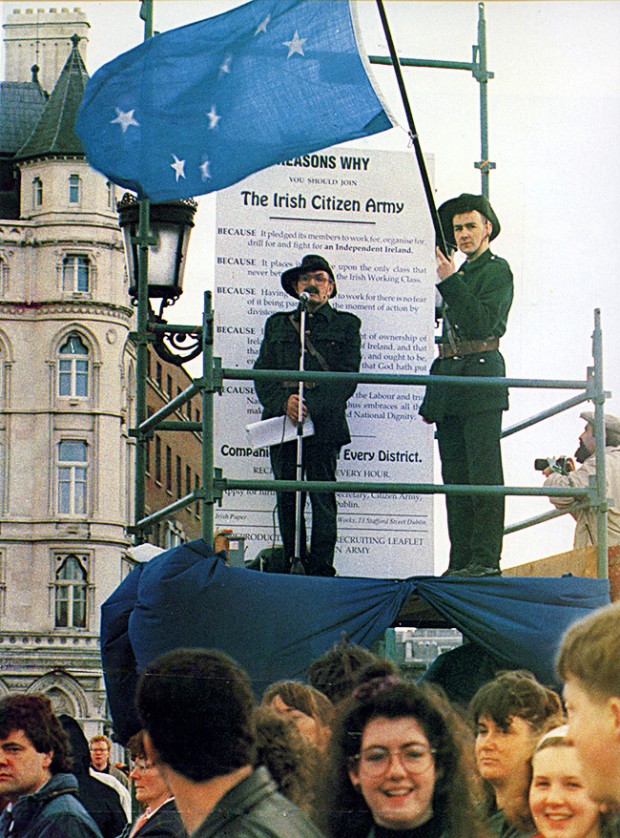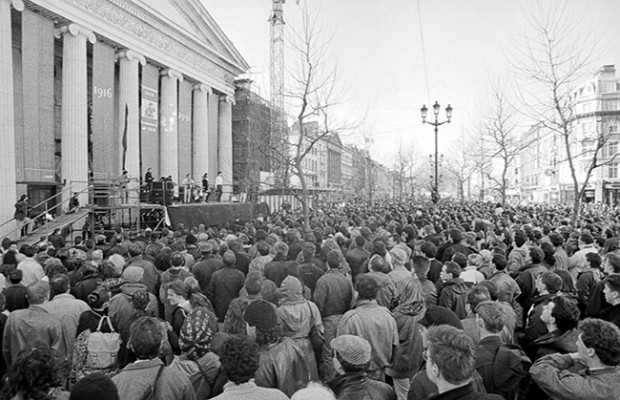19 April 2016
Reclaiming the Spirit of Easter 1916
First published in An Phoblacht/Republican News, 20 April 2006

THE 75th anniversary of the 1916 Rising in 1991 was reluctantly marked by the Irish Government with an extremely brief, low-key ceremony outside the GPO in Dublin.
Meanwhile, a broad-based organisation comprising artists, musicians, writers and ordinary people from across Ireland brought thousands onto the streets of the capital to celebrate the ideals of the Rising in the face of official neglect and contempt. Artist ROBERT BALLAGH – one of the organisers of this weekend’s Reclaim 1916 March, Pageant and Free Open-Air Concert – wrote in 2006 about the Irish Government plans.

● Robert Ballagh
WHEN I READ that the Government intended restoring the military parade in Dublin to commemorate the 90th anniversary of the Easter Rising, a wry smile formed on my face. I still retained clear memories of the remarkable experience of those brave souls who dared commemorate the 75th anniversary of the Rising.
In early 1990, a group of concerned citizens, aware that the Government seemed determined to ignore the anniversary, decided to take steps to ensure that the event was properly celebrated. I signed up to this initiative which took as its title “Reclaim the Spirit of Easter”.
My own reasons were both personal and complex. For many years I found myself dismayed by an intellectual atmosphere that had been allowed to develop that appeared to be driven by a kind of self-loathing. As a reaction to the conflict in the North, many Southern politicians and “thinkers” constructed a whole new way of seeing Ireland and the Irish. Nationalists were portrayed as negative, unco-operative and recalcitrant while hardline unionists were lionised by a sycophantic Dublin media. In this scenario the British played the role of a benevolent and frustrated neighbour attempting to separate two feuding delinquents.
Anyone who still clung to the point of view that branded British imperialism in Ireland as either a fact or a bad thing was dismissed as old-fashioned, narrow minded and, of course, soft on violence.
In the 1980s, those who were engaged in the creation of this anti-national bias were greatly assisted by Section 31 of the Broadcasting Act, the most draconian piece of political censorship operating in Europe at the time.
The final straw came for me when a Belfast actor I knew told me that he had auditioned for a part in an RTÉ drama but had been turned down on the basis that RTÉ felt that a Northern accent was too threatening! I thought 'enough is enough' and decided, there and then, to do something about this ridiculous situation. I felt certain that the impending 75th anniversary could provide me with a unique opportunity to challenge such feelings of guilt and self-hatred.
In 1990, when I became involved with the “Reclaim the Spirit of Easter” project I viewed it as a perfectly reasonable vehicle for cultural and historical reclamation. Imagine my surprise when someone quite casually remarked, during the course of a committee meeting, that the Special Branch were outside.
I wrote to the Chief Superintendent of the Garda to say that, while the police had the right to maintain surveillance on certain groups in certain circumstances, what we were experiencing was, in my opinion, more to do with clocking up overtime than in maintaining the security of the state.
As Easter approached, public interest in the 75th anniversary began to swell, stimulated I would suggest by our robust defence of 1916 and our determination to organise an adequate commemoration. However, this public influence came at a price.
Senator Shane Ross stated:
“The Reclaim the Spirit of 1916 group is menacing” and that the 1916 celebrations could be “hijacked by the Provisional IRA or one of its front organisations.” Desmond O’Malley, a Government minister, suggested we “served the interests of the Provisional IRA”.
Easter Sunday was chosen by the Government for the official commemoration of the 75th anniversary of the Easter Rising. They invited some surviving veterans of the Rising but managed to insult them by making no travel arrangements for them to attend. Some in fact were infirm, also one stayed away as a protest at what he saw as the current politicians’ betrayal of 1916. At the end of the short ceremony, as the President moved to depart, some of the veterans struggled to their feet in order to shake the hand of their President, only to be disappointed by officials whisking her past to her state car. Sadly, nobody had thought of such a simple way of honouring the veterans.

Eilish O’Regan wrote in the Sunday Independent:
“The guarded gestures of commemoration which marked last week’s official remembrance of Easter 1916 were ousted yesterday in favour of a rousing and unfettered celebration of the Rising.” Trish Hegarty in The Irish Times observed that “even the rain could not dampen the spirit of 1916 as thousands took to the streets on Saturday to celebrate and commemorate the 75th anniversary of the Easter Rising in a lively, colourful, dramatic, musical manner which contrasted starkly with the state’s short and sombre event on easter Sunday”.
The day got off to a damp start with an open-air concert at the top of Parnell Square, where musicians entertained groups and individuals from all over Ireland, from Britain and from the US before the parade itself set off down O’Connell Street, led by a pipe band. As it progressed along its route, actors proclaimed extracts from the speeches of many of the leaders of the period at various points along the way.
When the huge parade finally arrived at the GPO, “Committee Chairman Robert Ballagh” (according to Steve S. Scott) “gave a fiery speech, condemning the political, business and media establishment” which had tried to block the event at every turn. He said they had underestimated the patriotism of the people.

The speech was followed by a satirical pageant written and produced by Tomás Mac Anna. According to The Irish Times, it was “the highlight of the day, giving a dramatic and humorous presentation of what the organisers saw as the concerted attempt to write 1916 out of Irish history . . .
“A mock funeral procession, led by a piper, with 'Éire RIP' inscribed on the coffin lid, marched slowly on stage. Actors symbolising the political, legal and academic elements who wanted to bury Irish nationalism were portrayed in a biting satire that had the huge audience in stitches.”
“I’m personifying all of the TDs who have diluted the Proclamation, consigning Caithlín Ní Houlihan to the grave,” said an uncannily Dev-like Frank Kelly, while waiting to go on stage. Mark Lambert played a revisionist professor who suggested that “our school history books should contain a short paragraph to show coming generations how destructive and un-Irish the whole event was”.
The final speaker was a judge, played by Kevin Reynolds, who confirmed that the Rising was completely “illegal”. But they were all silenced as the coffin burst open and a woman symbolising Ireland emerged in a bright costume. The proceedings ended with the singing, by the large crowd, of Amhrán na bhFiann which echoed the length of O’Connell Street and beyond.
So, in spite of all the intimidation, harassment and misinterpretation, I’m proud to say that the Reclaim the Spirit group succeeded admirably in its main objective and that was to ensure that the 75th anniversary of the 1916 Rising was celebrated in an appropriate fashion.
Follow us on Facebook
An Phoblacht on Twitter
Uncomfortable Conversations

An initiative for dialogue
for reconciliation
— — — — — — —
Contributions from key figures in the churches, academia and wider civic society as well as senior republican figures





